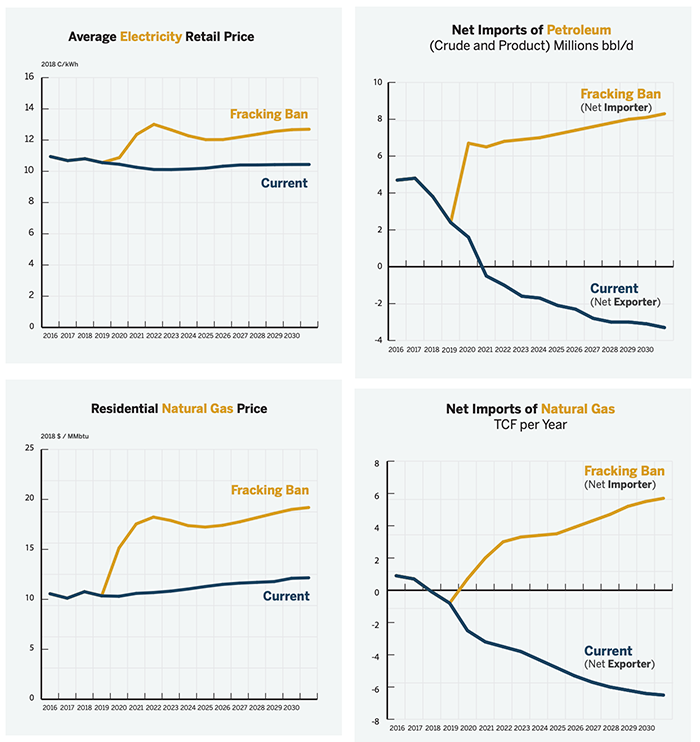Hydraulic fracturing has made the United States the top oil and natural gas producer in the world and it has made the nation energy independent for the first time in 62 years. Yet, during stages in the campaign, potential Democratic presidential nominee Joe Biden and his running mate Kamala Harris advocated a ban on fracking and a ban on drilling, sometimes entirely and sometimes only on federal lands and waters. A recent study shows that banning federal leasing and fracking on public and private lands would:
- cost up to 7.5 million American jobs in 2022,
- lead to a cumulative loss of $7.1 trillion in GDP by 2030,
- reduce household incomes by $5,400 annually,
- increase household energy costs by over $600 per year, and
- reduce farm incomes by 43 percent due to higher energy costs.
The United States would also lose its energy independence from the Middle East, importing more than 40 percent of its oil and petroleum supplies by 2030. It would also result in the United States importing almost 30 percent of its natural gas, rather than being the net exporter of natural gas we currently are. The impact is dramatic because over 95 percent of U.S. natural gas and oil wells today are developed using hydraulic fracturing. The impact of the bans on top of the losses experienced due to the coronavirus lockdown would be devastating to Americans and the U.S. economy, while decreasing national energy security and lessening our influence in energy markets throughout the world.
Increase in Costs
Under the bans, on average, residential natural gas prices are expected to increase 58 percent, electricity prices to increase 20 percent and gasoline and heating oil prices are expected to each increase 15 percent. Despite consuming less due to the higher prices, the average U.S. household is projected to spend $618 more per year for its energy: gasoline, natural gas, electricity, and heating oil. From 2020 to 2030, average household energy use is projected to decline by 12 percent.
Due to higher energy costs, the cost of farming and manufacturing will also increase. The cost of wheat farming is projected to increase 64 percent, the cost of corn farming to increase 54 percent and the cost of soybean farming to increase 48 percent. According to the U.S. Department of Agriculture, direct and indirect energy costs can account for 36 percent to 48 percent of total production costs for crops.
Energy is a huge component of modern agriculture. Farms use energy directly in the form of electricity, diesel, gasoline, and natural gas. They use it to move water and to irrigate crops, which is very energy consuming. Farms also use significant amounts of energy intensive products, including pesticides and fertilizers, much of which is sourced from natural gas. For example, natural gas can account for between 75 percent and 85 percent of fertilizer manufacturing costs. A ban on fracking and federal leasing could increase the cost of natural gas delivered to fertilizer manufacturers by an average of more than 170 percent. Fertilizer prices have been kept much lower to farmers as a consequence of the decline in natural gas prices attributable to hydraulic fracturing.

State Impact
If a fracking ban is enacted, the states projected with the highest job losses include:
- Texas with 1,103,000 job losses,
- California with 765,000 job losses,
- Florida with 711,000 job losses,
- Pennsylvania with 551,000 job losses, and
- Ohio with 500,000 job losses,
totaling 3.6 million job losses in 2022 in just those five states.
The states with the highest job losses as a share of overall employment include:
- North Dakota (76,000),
- Oklahoma (319,000),
- New Mexico (149,000),
- Wyoming (48,000),
- Louisiana (321,000),
- West Virginia (109,000)
- Kansas (208,000) and
- Colorado (353,000).
Conclusion
A ban on hydraulic fracturing and leasing would be devastating to the U.S. economy, increasing energy prices for electricity, natural gas, oil, and gasoline to the American consumer. Food costs would also increase as energy costs to farmers would also rise, which would also affect the competitiveness of products made by U.S. farmers for export to feed the world. Household energy costs would escalate and household incomes would decline dramatically. The U.S. economy would be at risk in falling into another recession with GDP in 2022 reduced by $1.2 trillion due to the bans. The U.S. would see massive unemployment again with 7.5 million jobs lost in 2022, but in this case they would be lost for good. Clearly, oil and natural gas is critical to the U.S. economy and the recovery that the American public currently needs from the coronavirus.
Though Joe Biden claims he will not ban fracking whenever he campaigns in Pennsylvania, he said he would ban it during his debate with Bernie Sanders in March. It is one of his many flip-flops during this presidential campaign. Increased U.S. energy self-sufficiency and the jobs created by fracking have brought enormous benefits to all Americans. Halting that enormous economic engine would cause very serious negative consequences for all Americans.



